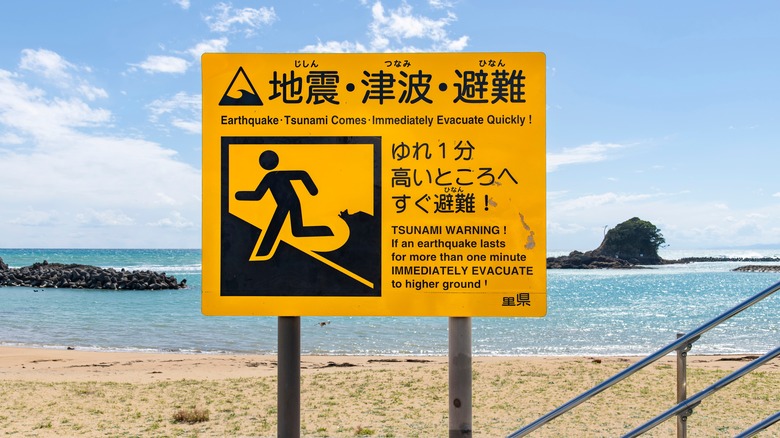What To Do If You Experience Earthquakes On Your Trip To Japan
For a lot of travelers, a trip to Japan is a once in a lifetime experience. For some, it's a destination that keeps calling them back. However, some people researching a potential trip to Japan become anxious when they hear about earthquakes that have struck the country in the past. After major seismic events, some even postpone or cancel their trips.
It's true that Japan is more likely to experience earthquakes than many other parts of the world, but shouldn't keep you from relaxing in steamy hot springs and watching monkeys in Yudanaka or perhaps visiting Tokyo Disneyland and hearing Darth Vader and Winnie the Pooh call out to you in Japanese. In the unlikely event that you experience a dangerous earthquake, stay calm, stay alert, and find a safe place to ride it out.
Japan has frequent earthquakes because of its location on the boundary of several tectonic plates. When the plates shift, Japan feels the rumble. While there have been deadly and destructive earthquakes, the vast majority are harmless — often lasting only a few seconds and too weak to be noticed. However, when serious ones do occur, it's important to take shelter indoors away from windows. If you're outside, move to an open area away from the risk of falling debris. The best way to prepare is to download the Safety Tips app created by the Japan National Tourism Organization. It provides English-language alerts about earthquakes in your area. While earthquakes are unpredictable, a few seconds of advance warning may be all you need to get to a safe place.
How to stay safe during a serious earthquake in Japan
If you get an alert that an earthquake is coming while you're in your capsule hotel in Osaka, a modern art museum in Tokyo, or a giant wooden temple in Kyoto, stay where you are. Getting into a doorway or taking cover under a heavy table is a good idea. The most important thing is to move away windows in case they shatter from debris and to avoid anything that could fall on you. If you're outdoors and can't take shelter in a safe building, get as far as possible from cars and structures that could collapse. Don't be tempted to head down into the metro for safety. If you're already underground, move away from anything that could fall. Be aware that trains will stop during earthquakes. If a train makes an emergency stop, hold onto something and wait it out.
Earthquakes pose more of a risk if you're on the coast, as they can trigger tsunamis. If you are near the water and an earthquake occurs, head for higher ground. Keep an eye out for Tsunami flags — four big red-and-white checkered squares — on the beach. These signal that a tsunami is expected and you need to leave immediately. If there's a tsunami warning, evacuate without delay, but don't wait to see if an official warning will be issued. If you know you'll be spending time at the beach, it's a good idea to learn the official evacuation route and keep the tsunami hazard map for the area so you know what to do in the event of an emergency.

